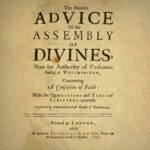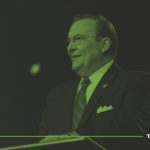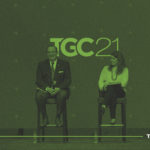On Friday, September 17, 2010, the Reverend Dr. Philip Graham Ryken, successor to James Montgomery Boice as senior pastor of the historic Tenth Presbyterian Church (PCA) in Philadelphia, Pennsylvania, was inaugurated as the eighth president of Wheaton College (1860), one of evangelicalism’s flagship institutions. It was my joy and privilege to be there, as a friend supporting and rejoicing with Phil, as an admirer of Wheaton College, as president of the Alliance of Confessing Evangelicals (for whom Phil has served as a board member, and continues to serve as a council member and speaker for one of our national broadcasts, “Every Last Word”), and as senior minister of the First Presbyterian Church (PCA) in Jackson, Mississippi (a congregation with long, deep, and numerous ties with Wheaton).
As friends of The Gospel Coalition may know, Phil is a member of TGC’s council, so it is appropriate to offer some reflections for TGC on the importance of this inauguration as a significant moment in the history of evangelicalism in our time. Obviously, we are thrilled for our friend and colleague Phil Ryken, and for Wheaton College. We view this as the perfect fit, and have so since Phil’s appointment was announced in February of this year. For many reasons.
I was struck by many things on that beautiful Friday in Wheaton. Allow me to share three of them here.
First is Phil’s appreciation for and perspective on the institution he now leads. A few months ago Joel Belz of World asked Phil if Wheaton still deserved the reputation of being the flagship institution of evangelicalism. Phil’s answer was deft and succinct:
By the grace of God, Wheaton continues to set a high standard of excellence in Christian liberal arts education. Wheaton is also a definitional institution. People both inside and outside the evangelical community look to the college for clarity about what it means to be evangelical. Although we do not claim a position of leadership for ourselves, we do seek to provide leadership where it is looked for.
I do not believe that answer could be improved upon. Not a syllable is wasted. It is indicative of Phil’s humility and his determination to promote a strong institutional self-understanding and humility. It was clear throughout the inaugural festivities that Phil intends that Wheaton be clear about who she is, what her role is, what her mission is, and what her accountabilities and responsibilities are. Even the title of his inaugural address captures this: “A World Servant in Christian Liberal Arts Education.” Don’t miss the word servant—it is not a mere slogan in the lexicon of Wheaton’s new president but a concrete aspiration. It is also clear that Phil will not be satisfied with a reductionist or ambiguous or atheological definition of evangelicalism.
Second is the set of credentials Phil brings to this task. During and after the presidential search process there were a few voices who were critical of the idea of a pastor being selected as the new president (just as there had been those who had rankled about this with the previous president, Duane Litfin, despite the fact that he held two earned doctorates!). Yet over and over in the inaugural ceremonies it was clear from trustees, faculty, students, and friends of the institution that Phil is enormously respected. And rightly so. Over and over, they echoed a theme: “Phil gets it.” By that, they mean a number of things. Phil understands and appreciates Wheaton, its culture, its mission, its legacy, its aspirations. It also means that Phil understands liberal arts education in general and Christian liberal arts education in particular.
Furthermore, Phil’s own competencies are impressive, and have been evidently perceived and appreciated by the Wheaton family. It is not just that Phil grew up in a Wheaton professor’s home and ate philosophy and English literature for breakfast with his Cheerios, or that he graduated from Wheaton with highest honors, or that he did his doctoral work at Oxford. Or that at a young age he gave able leadership to one of the flagship congregations of evangelicalism. Or that those who write for and receive edits by him have to go to therapy to get out of the fetal position after reading his revisions of their work. It is what he is and knows. Elsewhere I have put it this way:
The whole Wheaton family seems to know what a special man their new president is. They certainly seem to know that he genuinely loves them and cherishes the institution. Wheaton is led by a loving shepherd, with a rock solid commitment to historic Christian orthodoxy, a capacious intellect, a voracious appetite for knowledge, a prodigious literary output, a knack for acute cultural observation (as well as timely, bold and gracious engagement), an almost genetic understanding of the mission of liberal arts education, a commitment to what he (aptly) calls the reintegration of faith and learning, and a vision for deploying Wheaton’s resources “for Christ and his kingdom” globally.
And this leads me to a third thing, Phil’s pastoral heart and vision, in combination with his academic understanding and credentials. I believe that these will be a great blessing to this institution. Phil is a pastor. A real pastor. Seth Cohen’s testimony to that fact at the Inaugural Luncheon indelibly impressed this upon all present, as the headmaster of Spruce Hill Christian School in Philadelphia movingly recounted Phil’s home visit (just before he had to rush to the airport to leave for Singapore to teach) to his dying daughter who wanted to ask her pastor how a Christian prepares to die. If this was recorded and is available somewhere online—listen to it! Phil intends to pastor this institution. Elsewhere he has said: “I pray that my pastoral background will be an asset in resolving conflicts and building consensus, in exercising theological discernment, in edifying the student body through chapel addresses, and in fostering a community of grace on campus.”
And Phil is serious about that last point too: “fostering a community of grace on campus.” Phil wants a robust, gospel-derived theology, experience, and expression of grace to thrive at Wheaton. And if his pastoral aims and intentions are blessed by the work of the Spirit, this could be a very important thing for all of evangelicalism. So pray for him, that he will be blessed and kept by God’s grace, and that he will be faithful to Christ and the work of his kingdom.
Is there enough evidence for us to believe the Gospels?
 In an age of faith deconstruction and skepticism about the Bible’s authority, it’s common to hear claims that the Gospels are unreliable propaganda. And if the Gospels are shown to be historically unreliable, the whole foundation of Christianity begins to crumble.
In an age of faith deconstruction and skepticism about the Bible’s authority, it’s common to hear claims that the Gospels are unreliable propaganda. And if the Gospels are shown to be historically unreliable, the whole foundation of Christianity begins to crumble.


































